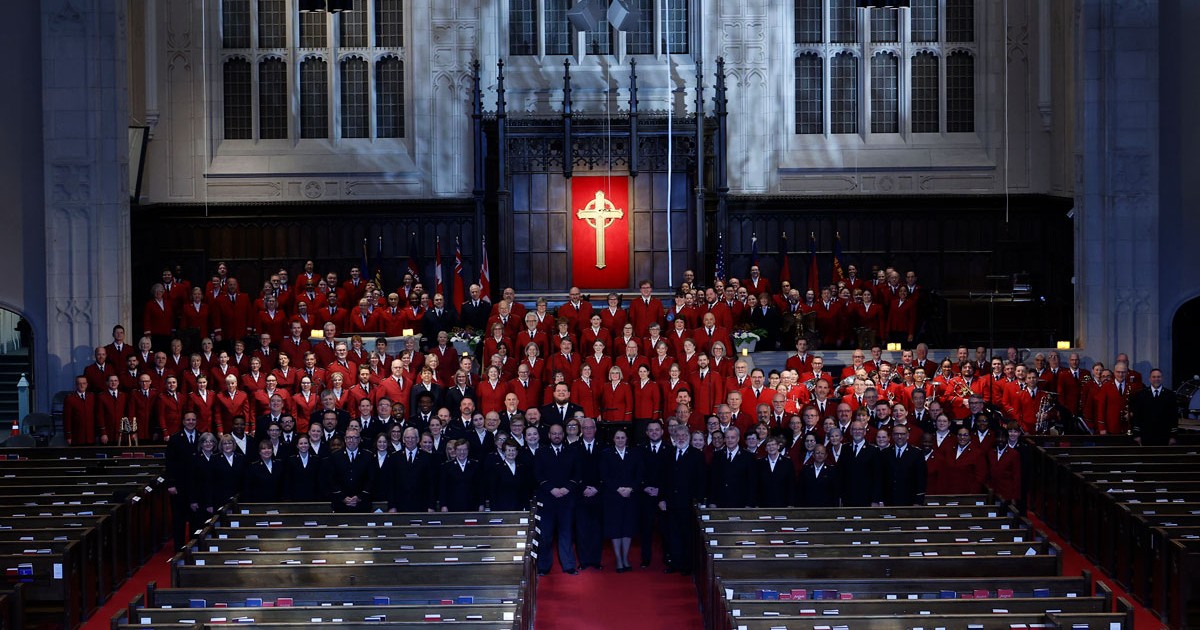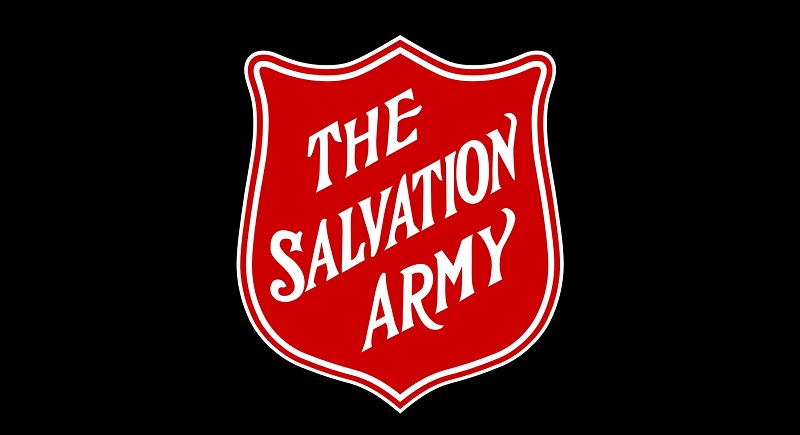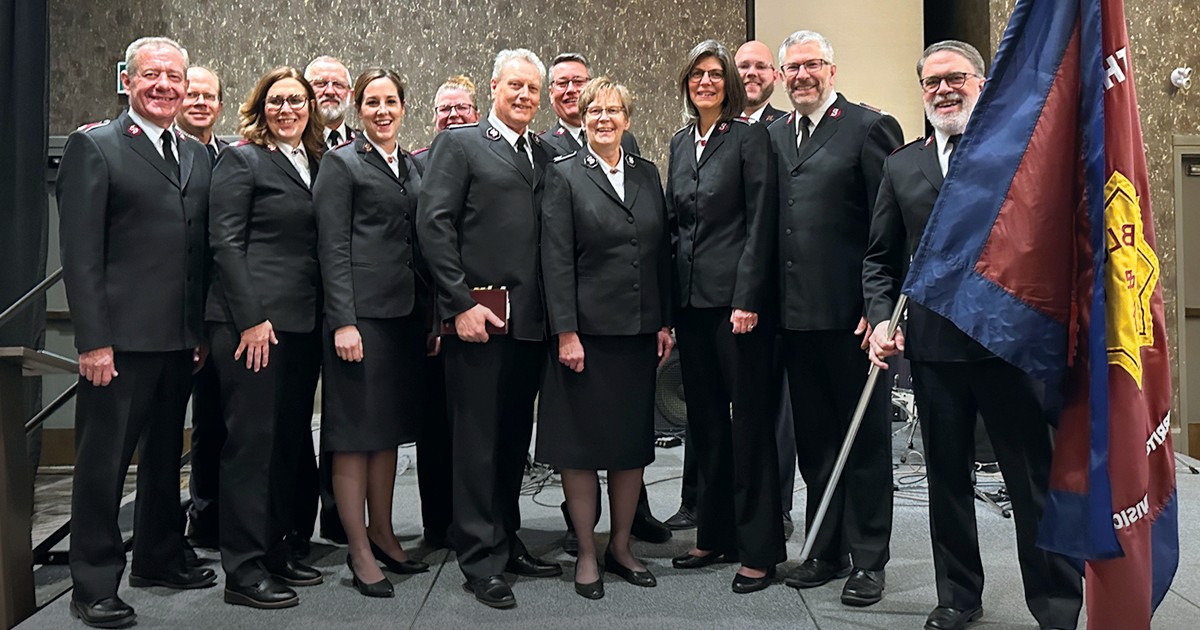I wasn't sure what to expect walking through the front door of Bermuda Harbour Light, but the warm welcome I received had nothing to do with the sunshine outside. This is a place where good things are happening to deserving people, where caring staff are making a difference in the lives of others.
Harbour Light is located in the heart of Hamilton, the island nation's capital, a beautiful harbour city famous for its shops, museums, galleries and international business connections. But even in such an idyllic place as Bermuda, people can fall victim to alcohol and drug addictions as they struggle with the challenges of daily living.
Visual Expressions
My assignment was to observe and write about the art therapy class taking place that morning at Harbour Light. The long table in the centre of the room was covered with drawings, pencils and markers, and I immediately recognized the eight men sitting around the table. The previous weekend we had all attended the Boundless Bermuda divisional congress with General André Cox and Commissioner Silvia Cox, the Army's international leaders. It was good to see the clients again. As they stood to shake my hand and say hello, we were joined by the class instructor and things got underway.
Art therapy uses creative materials to help clients visually express their emotions and experiences in their journey of recovery, particularly those who have difficulty verbally expressing themselves. Artistic ability is not required, and whether it's drawing a picture, creating a collage or some other artistic project, the men are free to express their feelings in a safe environment under the guidance of a counsellor.
Honest and Open
Today's class is led by Augustina Ibegbuna-Raynor, program director at Harbour Light, and continues from a previous session when the clients were asked to draw a picture expressing “Refusal skills I use today in recovery. Refusal skills I need to use in recovery.”
“Honesty, patience and anger are the main ones I'm working on today,” says one client as he stands to present his artwork to the group. He has drawn pictures of facial expressions and people that represent him losing his temper, an issue with which he struggles. One of the images depicts an incident when he and another client had a confrontation. The situation could have escalated into a physical altercation, but because of the progress he has made at Harbour Light, it was diffused.
Sharing the thoughts behind his picture and then receiving honest and open feedback from his peers—all of whom are at varying stages of their personal journeys to recovery—make this an effective and therapeutic activity.
“You need to put your hands up and just surrender,” remarks one of the men. “You are showing lots of progress in anger management.”
“You have the power to change,” says another. “You have to put the bully aside.”
Advocating for Others
In addition to art therapy, the staff provide a wide range of supports and services, such as anger management, relapse prevention, a 12-step class, life skills, Bible study and drug education. As the program director, Ibegbuna- Raynor handles the day-to-day operations of the program, supported by an addictions counsellor, a life-skills counsellor, residential workers and a chaplain.
“Counsellors are responsible for intakes and assessments, crisis intervention, family and relationship intervention, community outreach, individual and group therapy, and so much more,” says Ibegbuna-Raynor. “They advocate for our clients.”
As a residential addiction centre with 10 available spaces, Harbour Light offers a six-month to one-year program. “The typical stay is 12 months,” explains Ibegbuna-Raynor, “but this can be extended due to individual needs.”
Respect and Dignity
Beverly Daniels, a Salvationist who attends Cedar Hill Corps, is the executive director of community services, giving oversight to all social services programs operated by The Salvation Army in Bermuda. These include Harbour Light, a community life-skills program, emergency housing, street feeding program, thrift store, food bank, annual Christmas assistance program and emergency disaster services, which springs into action for hurricane relief as needed.
For Daniels, there is more to community services than meeting the physical needs of those who come to the Army for assistance. It also means living out the principles of integrated mission—a seamless blending of the Army's social programs with the expression of Christ's love that is at the core of what the Army was raised up to be.
An example of this integration is evident in the connections that have been made between the residents at Harbour Light and the corps family at Hamilton's North Street Citadel.
“The men often join us for worship,” explains Major Bruce Jennings, corps officer at North Street Citadel, who happily reports that four of the men have recently been welcomed as adherents. “And our corps sergeant-major, Rosemary Phillips, who is the chaplain at Harbour Light, has become a mother figure to many of the clients.”
During the General's visit to Bermuda, the men from Harbour Light featured prominently throughout congress events as they contributed vocal items under the leadership of Major Jennings, and prepared and served the meal for a special prayer breakfast with the international leaders.
It is this intimate joining of ministries that Daniels believes must be at the centre of everything they do. “We are dealing with people who have been through a lot of pain,” she says. “If we do not have the mind of Christ as we encounter them, even with the best of intentions, we will be less than compassionate, less than respectful. These people have dignity, and they deserve to be treated with dignity.”
As the men at Harbour Light bravely face the road to recovery that stretches ahead of them, they can be assured of the support, guidance and assistance of the Army community that surrounds them.
“I'm never going to be perfect,” a client concludes, “but I strive for it every day.”
Harbour Light is located in the heart of Hamilton, the island nation's capital, a beautiful harbour city famous for its shops, museums, galleries and international business connections. But even in such an idyllic place as Bermuda, people can fall victim to alcohol and drug addictions as they struggle with the challenges of daily living.
Visual Expressions
My assignment was to observe and write about the art therapy class taking place that morning at Harbour Light. The long table in the centre of the room was covered with drawings, pencils and markers, and I immediately recognized the eight men sitting around the table. The previous weekend we had all attended the Boundless Bermuda divisional congress with General André Cox and Commissioner Silvia Cox, the Army's international leaders. It was good to see the clients again. As they stood to shake my hand and say hello, we were joined by the class instructor and things got underway.
Art therapy uses creative materials to help clients visually express their emotions and experiences in their journey of recovery, particularly those who have difficulty verbally expressing themselves. Artistic ability is not required, and whether it's drawing a picture, creating a collage or some other artistic project, the men are free to express their feelings in a safe environment under the guidance of a counsellor.
Honest and Open
Today's class is led by Augustina Ibegbuna-Raynor, program director at Harbour Light, and continues from a previous session when the clients were asked to draw a picture expressing “Refusal skills I use today in recovery. Refusal skills I need to use in recovery.”
Receiving honest and open feedback makes this an effective and therapeutic activity
“Honesty, patience and anger are the main ones I'm working on today,” says one client as he stands to present his artwork to the group. He has drawn pictures of facial expressions and people that represent him losing his temper, an issue with which he struggles. One of the images depicts an incident when he and another client had a confrontation. The situation could have escalated into a physical altercation, but because of the progress he has made at Harbour Light, it was diffused.
Sharing the thoughts behind his picture and then receiving honest and open feedback from his peers—all of whom are at varying stages of their personal journeys to recovery—make this an effective and therapeutic activity.
“You need to put your hands up and just surrender,” remarks one of the men. “You are showing lots of progress in anger management.”
“You have the power to change,” says another. “You have to put the bully aside.”
Advocating for Others
In addition to art therapy, the staff provide a wide range of supports and services, such as anger management, relapse prevention, a 12-step class, life skills, Bible study and drug education. As the program director, Ibegbuna- Raynor handles the day-to-day operations of the program, supported by an addictions counsellor, a life-skills counsellor, residential workers and a chaplain.
“Counsellors are responsible for intakes and assessments, crisis intervention, family and relationship intervention, community outreach, individual and group therapy, and so much more,” says Ibegbuna-Raynor. “They advocate for our clients.”
As a residential addiction centre with 10 available spaces, Harbour Light offers a six-month to one-year program. “The typical stay is 12 months,” explains Ibegbuna-Raynor, “but this can be extended due to individual needs.”
Respect and Dignity
Beverly Daniels, a Salvationist who attends Cedar Hill Corps, is the executive director of community services, giving oversight to all social services programs operated by The Salvation Army in Bermuda. These include Harbour Light, a community life-skills program, emergency housing, street feeding program, thrift store, food bank, annual Christmas assistance program and emergency disaster services, which springs into action for hurricane relief as needed.
For Daniels, there is more to community services than meeting the physical needs of those who come to the Army for assistance. It also means living out the principles of integrated mission—a seamless blending of the Army's social programs with the expression of Christ's love that is at the core of what the Army was raised up to be.
An example of this integration is evident in the connections that have been made between the residents at Harbour Light and the corps family at Hamilton's North Street Citadel.
“The men often join us for worship,” explains Major Bruce Jennings, corps officer at North Street Citadel, who happily reports that four of the men have recently been welcomed as adherents. “And our corps sergeant-major, Rosemary Phillips, who is the chaplain at Harbour Light, has become a mother figure to many of the clients.”
During the General's visit to Bermuda, the men from Harbour Light featured prominently throughout congress events as they contributed vocal items under the leadership of Major Jennings, and prepared and served the meal for a special prayer breakfast with the international leaders.
It is this intimate joining of ministries that Daniels believes must be at the centre of everything they do. “We are dealing with people who have been through a lot of pain,” she says. “If we do not have the mind of Christ as we encounter them, even with the best of intentions, we will be less than compassionate, less than respectful. These people have dignity, and they deserve to be treated with dignity.”
As the men at Harbour Light bravely face the road to recovery that stretches ahead of them, they can be assured of the support, guidance and assistance of the Army community that surrounds them.
“I'm never going to be perfect,” a client concludes, “but I strive for it every day.”










Leave a Comment